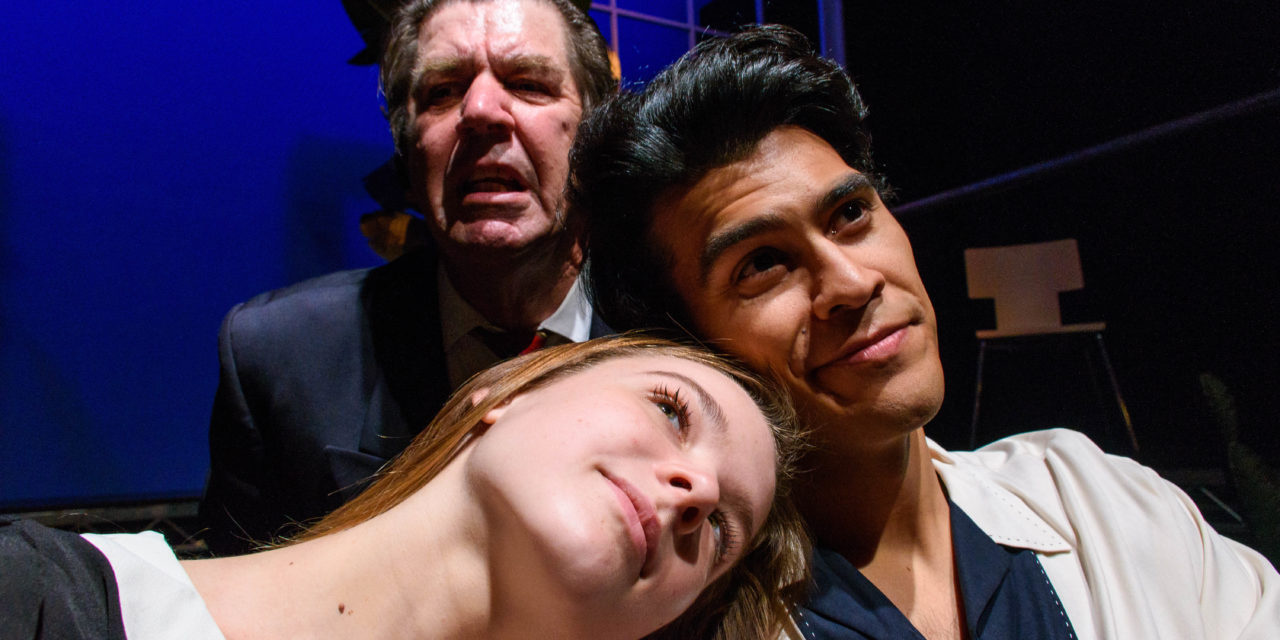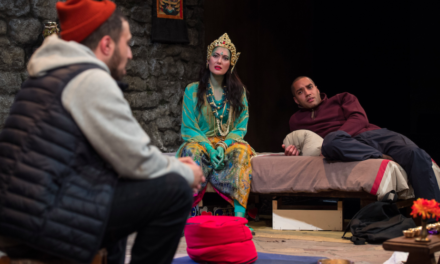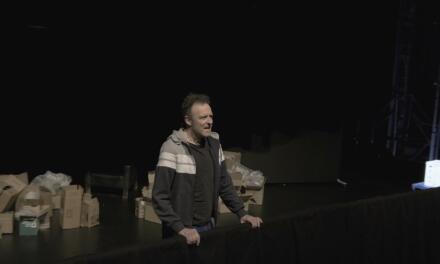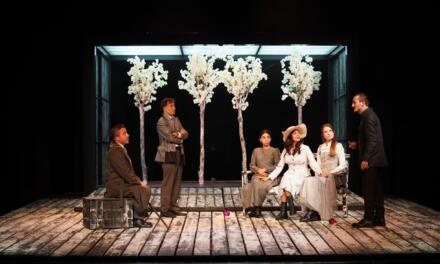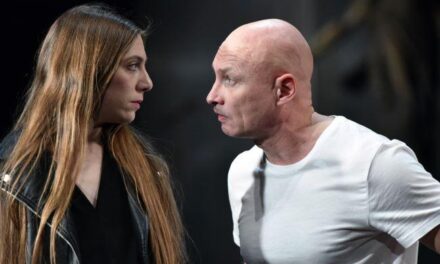Los Angeles can be a tricky theatre city to pin down. Though we do have a theatre district it is not necessarily centrally located nor conveniently grouped into one clearly defined area. The Music Center, Center Theatre Group, and the Pantages can offer up some visually stunning and emotionally engaging work with large stages, large houses, large casts and operating large budgets, but one of the more enjoyable aspects of the theatre-going experience for this reviewer in this sprawling city is the fact that this spatial reality has motivated companies to carve out niches in sometimes unexpected places and the City Garage Theatre is no exception.
If you visit their website citygarage.org you will get a solid first impression from the quote the company has chosen to feature in the site’s header; “Art is not a mirror held up to reality, but a hammer with which to shape it” [Bertolt Brecht is not credited on the site but that’s neither here nor there]. Founded in 1987, City Garage Theatre has called Bergamot Station [now named “26th Street Art Center”] their home for the last five years. Their work has garnered the company accolades and awards, including the Los Angeles Drama Critics Circle Award for Sustained Excellence in Theatre in 2011.
This arts center they call home is comprised of industrial structures that have been revamped into galleries and storefronts for creative businesses. On a Friday evening, we had chosen to visit City Garage there were tacos for sale via a makeshift food stand and people gathered for events at art galleries. The LA Metro’s Expo line stops within sight of the City Garage and made itself both felt and heard over the course of the evening, but that didn’t end up impairing the experience of watching Molière’s The School For Wives, which runs Fridays, Saturdays, and Sundays now through April 1, 2018.
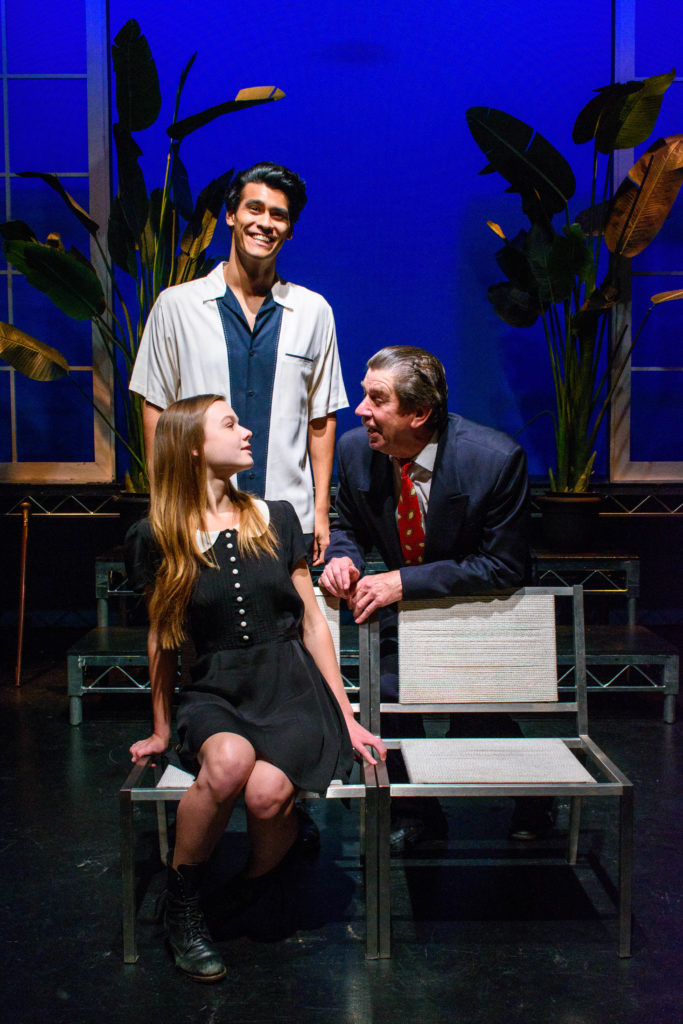
Clare Pida [Agnes], Buddy Brown [Horace] and Bo Roberts [Arnolphe] in Molière’s The School For Wives at the City Garage Theatre. Photo by Paul Rubenstein.
Directed by the City Garage’s Artistic Director Frédérique Michel and produced by Managing Director Charles Duncombe this new translation of the play [by Michel and Duncombe] may be set on paper in “a square in a provincial town in front of the house of character M. Arnolphe” but the white chairs, chrome touches, potted plants and solid blue wall make this feel more like a nod to Beverly Hills in a choice pays off in timely ways. The subject of the play also feels perfectly timed as it centers on rich merchant Arnolphe and his master plan for happiness [played by Bo Roberts decked out in a business suit–a period production this is not]. Having adopted orphan Agnes [Clare Pida] at the early age of four he has done everything he can to prevent her from learning anything he cannot teach himself. This way, he feels, he will create the perfect wife.
If you aren’t cringing at this thought in our age of #TimesUp and #MeToo, you need to spend some time alone thinking about why and you need to do some research. You could start by reading this play that Molière crafted for its first performance in 1662–for the man has some things to say to our culture in 2018. Arnolphe is so intimidated by an intelligent woman he will go to any length to diminish that capacity in his ward. Agnes subverts that unintentionally by being her true self and following her heart that leads her to admire Horace [Buddy Brown], a young family friend of Arnolphe’s who innocently asks for advice time and again from the one man who most wishes to crush this budding young love.
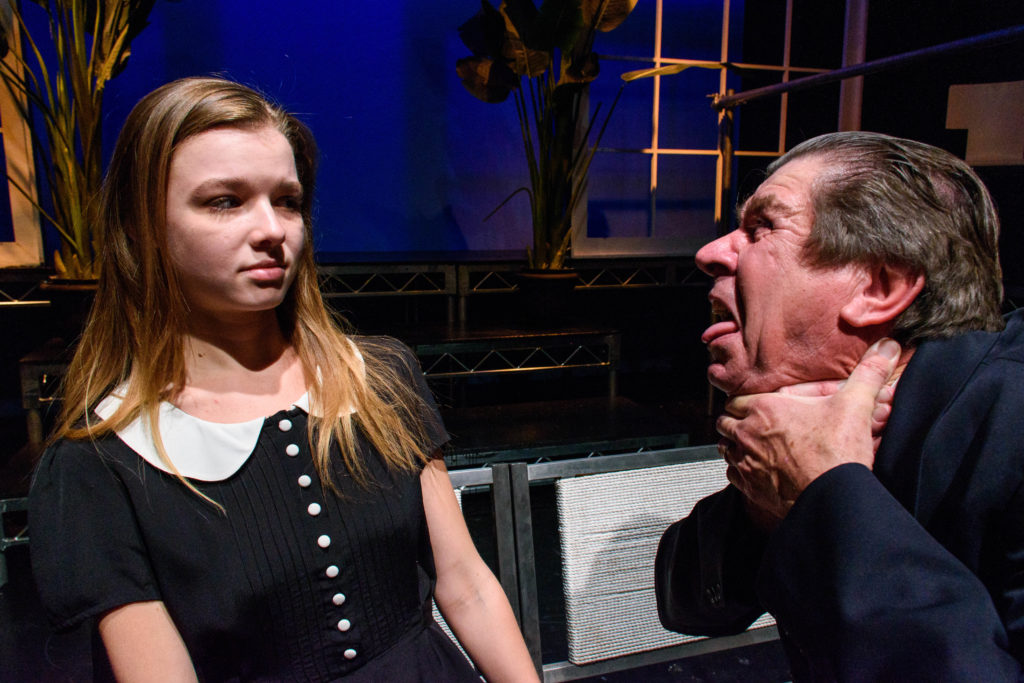
Clare Pida [Agnes] and Bo Roberts [Arnolphe]. Photo by Paul Rubenstein.
Mr. Roberts plays Arnolphe with a comedic yet palpable sense of desperation as he loses control over the one situation that seemed most certain of in his life. Though his plan sounds like a ridiculous way to go about securing true and devoted love there is nothing ultimately ridiculous in the way Mr. Roberts expresses his desire to keep Agnes for himself. It isn’t that far of a leap to look at Arnolphe’s plan and see it reflected in any number of matches where a rich and powerful man has secured a younger woman as his wife who he might hope to keep ignorant of the world and his actions in it. It isn’t that far of a leap to look at the White House right now and wonder what Molière might make of it.
Thankfully we have his voice in the character of Chrysalde [Troy Dunn]–a devil’s advocate of a character who is played with impish delight by Mr. Dunn–though one wonders whether perhaps his red suit points to his role a bit too literally. Chrysalde delights in finding the holes in Arnolphe’s plan, in putting concrete names to the things Arnolphe’s most fears from an intelligent woman including cuckoldry, and in the eventual if not inevitable way events work out when Agnes is revealed to be the long-lost child of a Henriette [Trace Taylor, though in the play this was originally written as man named Henri] and the bride that Horace’s father Oronte [Tom Lasky] has chosen for him against his will. The young lovers are thrilled to be united this way, Chrysalde is amused to no end by his friend’s despair and Arnolphe is left dumbfounded by the outcome.
There’s a lot to enjoy in the moments throughout the play that pointedly underscores the cultural assessment Molière presents in this piece. Frédérique Michel seems to underscore satiric elements by encouraging the performers to engage in a stylized physicality that doesn’t always quite land the way it might have been intended. For example, an opening sequence where we meet most of our characters via a physical series of gestures and movement has Horace and Agnes coming together visually in a series of ballet moves that do not feel either as graceful as one might expect or as pushed to the clumsier extreme if one is meant to imagine there is a second layer of commentary at work. Patterns of speech can also at times feel stilted and overly formal and that constantly draws our attention away from the experience of the character in the moment to the language. This might have been intentional, it might have been a symptom of an early performance–but one wonders what it accomplishes if the former is true.
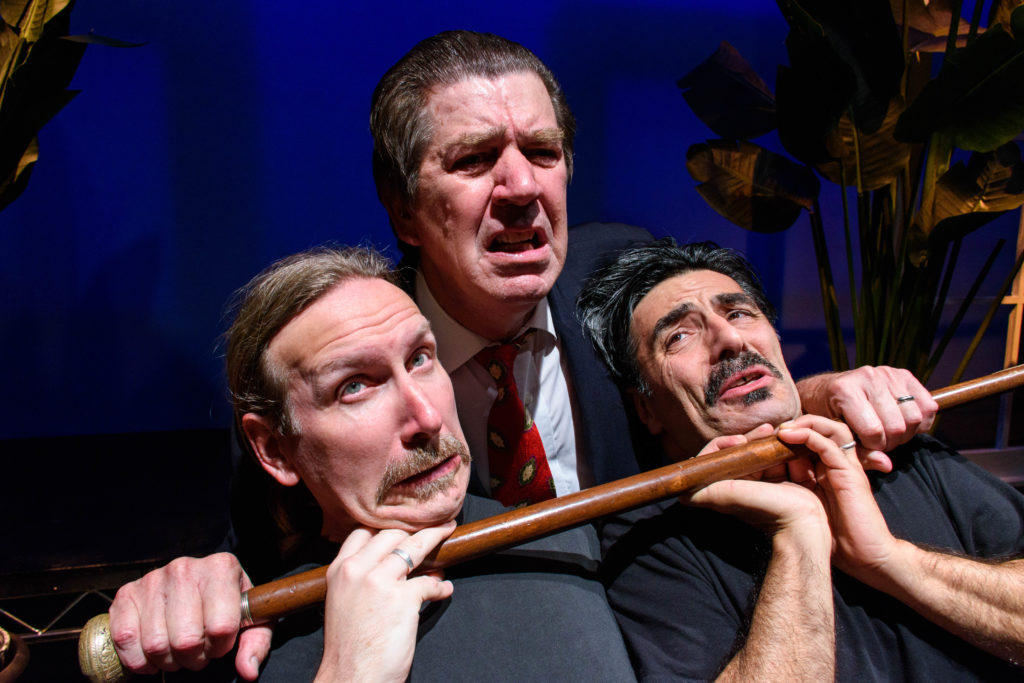
David E. Frank [Alain], Jaime Arze [George], and Bo Roberts [Arnolphe]. Photo by Paul Rubenstein.
The play comes most vibrantly alive in the moments where Arnolphe’s two servants George [Jaime Arze] and Alain [David E. Frank] appear. These two clowns and unwitting saboteurs to both Horace and Arnolphe’s plans make inventive use of every corner of the set and help keep us grounded as audience members for they are also present, watching events unfold, uncertain of how they will turn out. Set and Lighting Design by Charles Duncombe is minimal, but both suit the staging of the play. It’s clear this company knows how to make the most of the space they are in and any company their size would rightly be jealous of the way they have organized their backstage space to act as both storage for an impressive costume collection and comfortable green room area for performers waiting to go on.
Recalling the aforementioned train, one does wonder whether its recent arrival has impacted the work the company is doing as it is something of an audible challenge. The one available bathroom situated several doors down from the theatre made for a stressful intermission as this reviewer, in particular, was unlucky enough to be the last in line [plan ahead my friends–and better than I did]. But the bathroom is a minor concern and the train started to sound like a warning call to everyone listening to words that were written hundreds of years ago that somehow, remarkably, ring loud and true.
With Costume Design by Josephine Poinsot, Sound Design & Publicity Photos by Paul Rubenstein, the play features Bo Roberts [Arnolphe], Clare Pida [Agnes], Buddy Brown [Horace], Jaime Arze [George], David E. Frank [Alain], Troy Dunn [Chrysalde], Tom Lasky [Oronte], and Trace Taylor [A Notary and as Henriette, Mother of Agnes], The School For Wives runs approx. 1 hours 50 minutes including a 10-minute intermission.
This post was written by the author in their personal capacity.The opinions expressed in this article are the author’s own and do not reflect the view of The Theatre Times, their staff or collaborators.
This post was written by Christine Deitner.
The views expressed here belong to the author and do not necessarily reflect our views and opinions.

